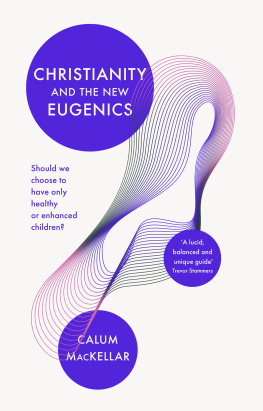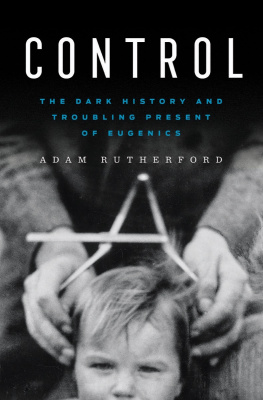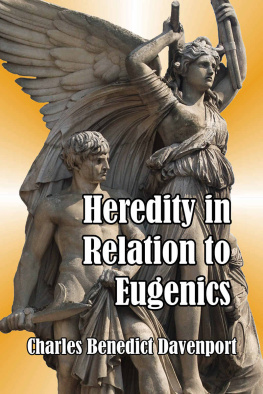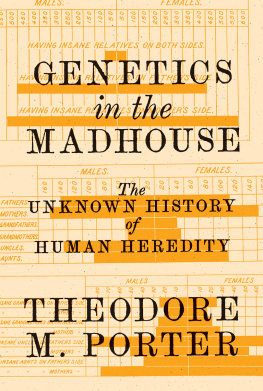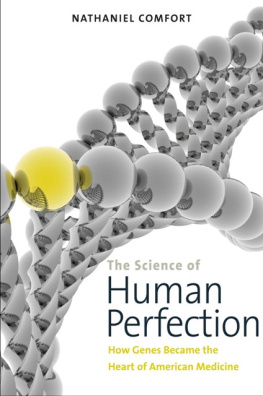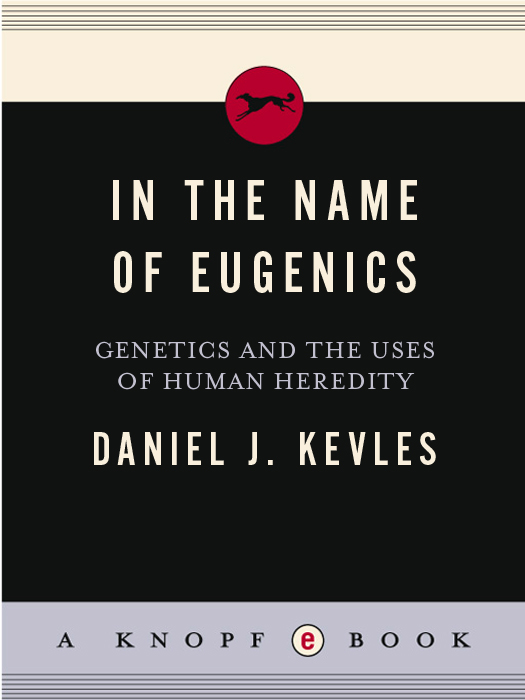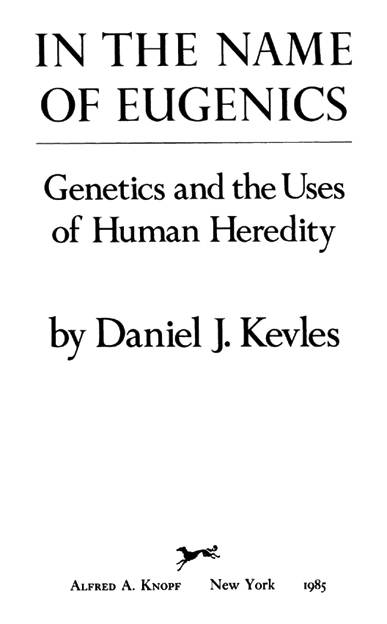THIS IS A BORZOI BOOK
PUBLISHED BY ALFRED A. KNOPF, INC.
Copyright 1985 by Daniel J. Kevles
All rights reserved under International and Pan-American Copyright Conventions. Published in the United States by Alfred A. Knopf, Inc., New York, and simultaneously in Canada by Random House of Canada Limited, Toronto. Distributed by Random House, Inc., New York.
Portions of this work originally appeared in The New Yorker.
Grateful acknowledgment is made to The Society of Authors Ltd. on behalf of the Estate of Bernard Shaw for permission to quote from Bernard Shaws letters. Bernard Shaw texts copyright 1985 by the Trustees of the British Museum, the Governors of the National Gallery of Ireland and Royal Academy of Dramatic Art.
Library of Congress Cataloging in Publication Data
Kevles, Daniel J.
In the name of eugenics: genetics and the uses of human heredity.
1. EugenicsHistory. 2. Heredity, human. 3. Race discrimination. 4. Genetic engineering.
I. Title.
HQ751.K48 1985 304.5 84-47810
eISBN: 978-0-307-83150-7
Published May 28,1985
v3.1
For my mother and father, with thanks
CONTENTS
PREFACE
T HE WORD eugenics was coined in 1883 by the English scientist Francis Galton, a cousin of Charles Darwin. Galton, who pioneered the mathematical treatment of heredity, took the word from a Greek root meaning good in birth or noble in heredity. He intended it to denote the science of improving human stock by giving the more suitable races or strains of blood a better chance of prevailing speedily over the less suitable. Since Galtons day, eugenics has become a word of ugly connotationsand deservedly. In the first half of the twentieth century, eugenic aims merged with misinterpretations of the new science of genetics to help produce cruelly oppressive and, in the era of the Nazis, barbarous social results. Nonetheless, in recent years, Galtonian premises have continued to figure in social discoursenotably in the claims of those arguing for a racial basis of intelligence, in certain tenets of human sociobiology, and in some proposals for human genetic engineering.
I was led to write this history of eugenics partly by the recognition that the subject casts a shadow over all contemporary discourse concerning human genetic manipulation. The history of modern physics (a field in which I have previously worked) reveals how unprepared we were to deal with the momentous issues that the release of nuclear energya feat requiring only a few years of concentrated effortsuddenly compelled us to confront in 1945. In 1963 the great British biologist J. B. S. Haldane declared that the genetic modification of man was likely to be still millennia away, but he added: I remember that in 1935 I regarded nuclear energy as an improbable source of power. Acquisition of the knowledge and techniques for human genetic intervention would pose challenges which, while different in kind from those of the nuclear revolution, may be comparable in magnitude, and it is none too soon to examine them in historical context.
I was also convinced that eugenics held a rich variety of opportunities for historical investigation as such. There have been a number of important studies of the subject, but most have dealt with it in only one country or another, tended to view it through the lens of the Holocaust, and halted the story in the early 1930s. I have made this book a comparative history of eugenics in the United States and Britain from the late nineteenth century to the present day, giving attention to its expressions elsewhere, especially in Germany, insofar as they affected Anglo-American developments. The comparative approach has helped to explain certain important features of this historyfor example, why a eugenic legislative program succeeded at least partially in the United States but not at all in Britainthat would otherwise have remained puzzling. I have also attempted a critical assessment of Anglo-American eugenicists as they diversely recognized themselves before the Nazis came to power; and the assessment has led me to depart from prevailing interpretations to advance the view instead that eugenics involved not only scientific rationalizations of class and race prejudice but a good deal more, including disputes over how men and, especially, women of the modern era were to accommodate to changing standards of sexual and reproductive behavior.
So much was said and done in the name of eugenics that this book of necessity merges history of science with social, cultural, and political history. It explores the interplay between, on the one hand, the social assertions made by eugenicists and, on the other, advances in pertinent sciences, particularly genetics in relation to man. Since about 1930, that interplay has been strongly affected by research in human genetics. I have here ventured the first historical account of the development of that field through the early sixties, and I have also sketched its remarkable progress since then, not to provide a comprehensive handbook of its specialtiesthe contemporary state of gene therapy, saybut to deal with such topics in a way that is indicative of emerging problems and possibilities.
This book is thus not an up-to-the-minute technical guide, and it is certainly not a tract for the times. I am under no delusion that a history of eugenics will provide any detailed moral or political map to follow in the uncharted territory of human genetic engineering. What I do expect from such an exploration is at least some assistance in disentangling the benefits we might aim for from the pitfalls we might legitimately fear. I hope that this historical journey will suggest to the readeras it has to mehow one might think about the human genetic future, and how one might thread a path into it of good sense, reason, and decency.
D.J.K.
Pasadena, California
December 1984
Chapter I
FRANCIS GALTON,
FOUNDER OF THE FAITH
F RANCIS G ALTON , innocent of the future, confidently equated science with progress. All around him the technology of the industrial revolution confirmed mans mastery over inanimate nature. To be sure, in the mid-Victorian era, heredity in plants and animals was less a science than a body of lore based on empirical practice. In the common understanding, scientific and otherwise, like tended to produce like, although in fact like often produced something quite different. Ideas of human heredity were particularly vague and contradictory. The science of geneticsindeed, the word genetics itselfhad not yet been invented. Gregor Mendels paper, the foundation of that discipline, was not only unappreciated but generally unnoticed by the scientific community. Nevertheless, it was well known that by careful selection farmers and flower fanciers could obtain permanent breeds of plants and animals strong in particular characters. Could not the race of men be similarly improved? Galton wondered. Could not the undesirables be got rid of and the desirables multiplied? Could not man actually take charge of his own evolution?
Galton first published his eugenic ideas in 1865well before he coined the word itselfin a two-part article for Macmillans Magazine which he subsequently expanded into a book, Hereditary Genius, published in 1869.
That conviction made Galton confident that it would be quite practicable to produce a highly gifted race of men by judicious marriages during several consecutive generations.


